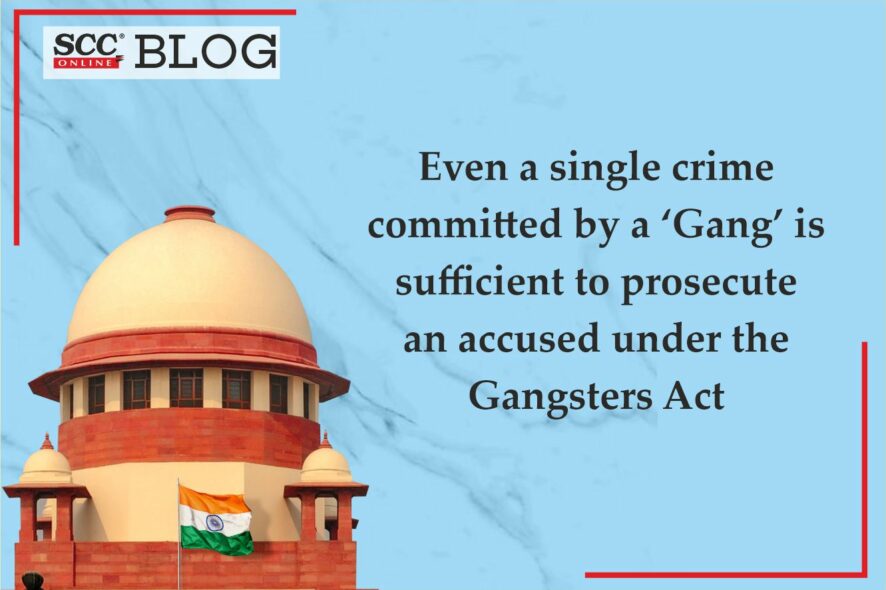Supreme Court: In a case where it was argued before the Court that an accused cannot be prosecuted under the Gangsters Act, 1986 for a single offence/FIR/charge sheet with respect to any of the antisocial activities mentioned in Section 2(b), the bench of MR Shah* and BV Nagarathna, JJ has held that even a single crime committed by a ‘Gang’ is sufficient to implant Gangsters Act on such members of the ‘Gang’.
Observing that there is no specific provision under the Gangsters Act, 1986 like the specific provisions under the Maharashtra Control of Organized Crime Act, 1999 and the Gujarat Control of Terrorism and Organized Crime Act, 2015 that while prosecuting an accused under the Gangsters Act, there shall be more than one offence or the FIR/charge sheet, the Court said that
“even in case of a single offence/FIR/charge sheet, if it is found that the accused is a member of a ‘Gang’ and has indulged in any of the anti-social activities mentioned in Section 2(b) of the Gangsters Act, such as, by violence, or threat or show of violence, or intimidation, or coercion or otherwise with the object of disturbing public order or of gaining any undue temporal, pecuniary, material or other advantage for himself or any other person and he/she can be termed as ‘Gangster’ within the definition of Section 2(c) of the Act, he/she can be prosecuted for the offences under the Gangsters Act.”
On a fair reading of the definitions of ‘Gang’ and ‘Gangster’ under the Gangsters Act, 1986, the Court explained that a ‘Gang’ is a group of one or more persons who commit/s the crimes mentioned in the definition clause for the motive of earning undue advantage, whether pecuniary, material or otherwise. Even a single crime committed by a ‘Gang’ is sufficient to implant Gangsters Act on such members of the ‘Gang’. The definition clause does not engulf plurality of offence before the Gangsters Act is invoked.
A member of a ‘Gang’ acting either singly or collectively may be termed as a member of the ‘Gang’ and comes within the definition of ‘Gang’, provided he/she is found to have indulged in any of the anti-social activities mentioned in Section 2(b) of the Gangsters Act.
Further, a ‘Gangster’ means a member or leader or organiser of a gang including any person who abets or assists in the activities of a gang enumerated in clause (b) of Section 2, who either acting singly or collectively commits and indulges in any of the anti-social activities mentioned in Section 2(b) can be said to have committed the offence under the Gangsters Act and can be prosecuted and punished for the offence under the Gangsters Act.
Reading the relevant provisions of the Gangsters Act together, the Court concluded that there can be prosecution against a person even in case of a single offence/FIR/charge sheet for any of the anti-social activities mentioned in Section 2(b) of the Act provided such an anti-social activity is by violence, or threat or show of violence, or intimidation, or coercion or otherwise with the object of disturbing public order or of gaining any undue temporal, pecuniary, material or other advantage for himself or any other person.
The Court was deciding the case where allegedly the main accused P.C. Sharma was a gang leader and who was the mastermind and he hatched the criminal conspiracy along with other co-accused including the appellant to commit the murder of the deceased Sadhna Sharma for a pecuniary benefit as there was a property dispute going on since long between the family members. The other co-accused were already charge sheeted/prosecuted for the offence under the Gangsters Act and therefore the appellant and the other two co-accused being members of the ‘Gang’ were also required to be prosecuted for the offences under the Gangsters Act also like other co-accused.
Applying the law enunciated above to the facts and circumstances of the case, the Court held that it cannot be said that no prosecution could have been initiated against the appellant-accused for the offences under Sections 2/3 of the Gangsters Act, 1986.
[Shraddha Gupta v. State of Uttar Pradesh, 2022 SCC OnLine SC 514, decided on 26.04.2022]
*Judgment by: Justice MR Shah
Counsel
For appellant: Advocate Divyesh Pratap Singh
For State: Advocate Sanjay Kumar Tyagi
For informant: Advocate Shuvodeep Roy






